 Crashing on a mammoth Wired opus today, as well as reviewing the final page proofs for The Skies Belong to Us (which is now endorsed by some thoroughly amazing folks). Back on Monday, provided Asteroid 2012 DA14 doesn’t veer off course and dinosaur us all.
Crashing on a mammoth Wired opus today, as well as reviewing the final page proofs for The Skies Belong to Us (which is now endorsed by some thoroughly amazing folks). Back on Monday, provided Asteroid 2012 DA14 doesn’t veer off course and dinosaur us all.
Mistakes Were Made
February 15th, 2013
Comments Off on Mistakes Were MadeTags:hijacking·regrets·Tasmin Fitzgerald·The Skies Belong to Us
Grudge Match
February 14th, 2013
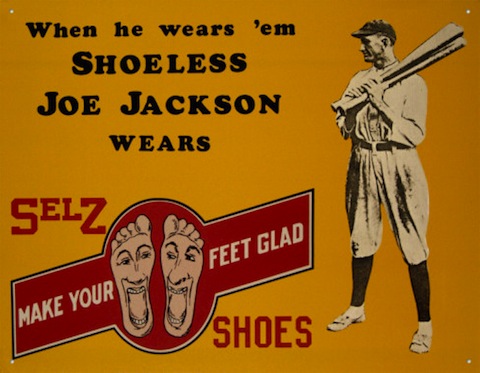 When Senator Warren B. Rudman recently passed, I was struck by the concluding section of his New York Times obituary, which contained an anecdote that attested to his stubbornness:
When Senator Warren B. Rudman recently passed, I was struck by the concluding section of his New York Times obituary, which contained an anecdote that attested to his stubbornness:
Mr. Rudman feuded with his alma mater long after he had left its campus. In 1952, Syracuse University withheld his bachelor’s diploma because he had refused to pay an $18 fee for the yearbook, saying he had not been told of the charge in advance. After he was elected to the Senate, Syracuse offered him the degree or, if he preferred, an honorary degree. It eventually mailed him the diploma, but he never opened the package, and he later blocked an earmark of several million dollars for the university.
This story got me thinking about narratives in which tiny, even accidental slights can have life-altering repercussions down the line. A classic example from recent popular culture is probably Seasons Two of The Wire, in which a seemingly innocuous rivalry over stained-glass windows leads to a hard-working family’s total destruction. Yet I much prefer a tale from the realm of the real—the backstory on the whole Black Sox scandal as recounted by Shoeless Joe Jackson in this 1949 interview. According to Jackson, his lifetime banishment from the game was due solely to bad blood that existed between Chicago White Sox owner Charles Comiskey and American League president Ban Johnson—bad blood that stemmed from a truly petty dispute:
I’ll tell you the story behind the whole thing. The trouble was in the front office. Ban Johnson, the president of the American League, had sworn he’d get even with Mr. Comiskey a few years before, and that was how he did it. It was all over some fish Mr. Comiskey had sent to Mr. Johnson from his Wisconsin hunting lodge back about 1917. Mr. Comiskey had caught two big trout and they were such beauties he sent them to Mr. Johnson. He packed the fish in ice and expressed them, but by the time they got to Chicago the ice had melted and the fish had spoiled. They smelled awful and Mr. Johnson always thought Mr. Comiskey had deliberately pulled a joke on him. He never would believe it any other way.
That fish incident was the cause of it all. When Mr. Johnson got a chance to get even with Mr. Comiskey, he did it. He was the man who ruled us ineligible. He was the man who caused the thing to go into the courts. He did everything he could against Mr. Comiskey.
There has to be some competitive advantage of being prone to grudges—they can be such a powerful motivator, perhaps even more so than the desire for creature comforts. But when a grudge is finally won after many years, even a lifetime of struggle, how often are the psychological rewards worth the accumulated bile?
Comments Off on Grudge MatchTags:baseball·politics·psychology·Shoeless Joe Jackson·sports·The Wire·TV·Warren Rudman
The Hieroglyphics of Vagabonds
February 12th, 2013
 Last summer we marveled at the complexity of hobo pictographs, which we took to be a uniquely American phenomenon. But as this 1872 dictionary of slang from London makes clear, the tradition of wordless transient communication traces back to the Old World. In decidedly non-PC language, the author argues that this code was created by the semi-nomads we now call Travellers, who used markings to alert comrades to meeting spots. And as discussed in our earlier post, this mode of communication was attuned to the Western habit of processing information from left to right:
Last summer we marveled at the complexity of hobo pictographs, which we took to be a uniquely American phenomenon. But as this 1872 dictionary of slang from London makes clear, the tradition of wordless transient communication traces back to the Old World. In decidedly non-PC language, the author argues that this code was created by the semi-nomads we now call Travellers, who used markings to alert comrades to meeting spots. And as discussed in our earlier post, this mode of communication was attuned to the Western habit of processing information from left to right:
Gipsies (sic) follow their brethren by numerous marks, such as strewing handfuls of grass in the daytime at a four lane or a crossroads; the grass being strewn down the road the gang have taken; also, by a cross being made on the ground by a stick or a knife–the longest end of the cross denotes the route taken. In the nighttime a cleft stick is placed in the fence at the cross roads, with an arm pointing down the road their comrades have taken. The marks are always placed on the left-hand side, so that the stragglers can easily and readily find them.
The dictionary’s whole list of bygone slang is worth a read, too. So many great words to add to my everyday vocabulary, starting with “akeybo” and “albertopolis.”
Comments Off on The Hieroglyphics of VagabondsTags:England·hobos·language·slang·Travellers
Male Ruffled Grouses in the Mist
February 8th, 2013
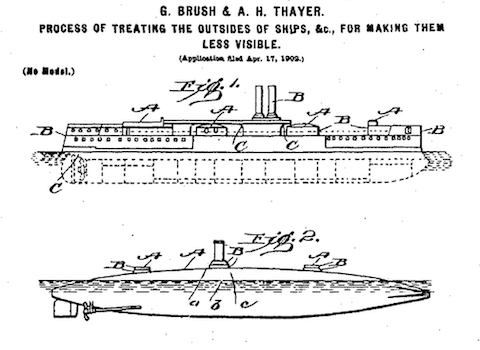 The latest post from the indispensable Camoupedia recounts the career of Gerome Brush, an artist with whom I was previously unfamiliar. His anonymity is undeserved, however, as he played an instrumental role in the advent of military camouflage; he helped fellow artist Abbott Handerson Thayer patent the first concept for the visual concealment of ships in 1902, an innovation that was later put to excellent use in the bedazzling of World War I naval vessels. There is perhaps no greater example of the practical application of artistic skill.
The latest post from the indispensable Camoupedia recounts the career of Gerome Brush, an artist with whom I was previously unfamiliar. His anonymity is undeserved, however, as he played an instrumental role in the advent of military camouflage; he helped fellow artist Abbott Handerson Thayer patent the first concept for the visual concealment of ships in 1902, an innovation that was later put to excellent use in the bedazzling of World War I naval vessels. There is perhaps no greater example of the practical application of artistic skill.
An expert of camouflage history would surely argue, however, that Thayer deserves greater credit. It was his 1909 book Concealing Coloration in the Animal Kingdom (co-authored with his son, Gerald) that is considered the foundational work of this highly functional art form; I highly recommend this painting of the male ruffled grouse as the perfect way to understand the thought process that led Thayer to his eureka moment.
Comments Off on Male Ruffled Grouses in the MistTags:art·camouflage·World War I
So Far from the Zenith
February 6th, 2013
It is tough not to be saddened by the unraveling of English soccer hero Paul Gascoigne, who is currently drying out at an American rehabilitation facility after a very long, very public battle with a virulent strain of alcoholism. Like so many celebrities who we adore for their bad behavior, Gazza became trapped in a destructive feedback loop—the more he pushed his body to the limit, the more we marveled that this obviously troubled man could have once been among the planet’s foremost athletes. And the demon inside Gazza seems to have taken perverse pleasure in creating that logic-defying persona—though, inevitably, that pleasure melted into self-hate, and the cycle of addiction became ever-more firmly entrenched.
To truly appreciate the bind that Gazza now finds himself in, one must understand the heights that he reached. Doing so does not require knowledge of his sporting feats, but rather a familiarity of the perks those feats created—most notably, entree to the world of music, an aspiration of many a successful athlete filled with hubris. This extremely well-researched piece details every in and out of Gazza’s brief but energetic musical career, in which his will to top the charts was exceeded only by his irredeemable narcissism. He seemed genuinely surprised when his songs were greeted with derision more than love—it was the first time in ages that he realized that he could, in fact, do wrong. For someone with the massive ego required to succeed at the topmost levels of sport, such an epiphany is about the most unwelcome thing imaginable.
Another of Gazza’s party anthems here. You can blame the man for lack of talent, but you certainly can’t blame him for lack of spirit.
Comments Off on So Far from the ZenithTags:alcoholism·England·music·Paul Gascoigne·soccer·sports
Supreme Mathematics
February 4th, 2013
 A great illness has swept the royal Microkhan yurts in Queens, and so I must dedicate the bulk of today to making sure the clan recuperates in fine style. Back soon with something tasty—in the meantime, please enjoy another sample from our burgeoning collection of book-related images and info.
A great illness has swept the royal Microkhan yurts in Queens, and so I must dedicate the bulk of today to making sure the clan recuperates in fine style. Back soon with something tasty—in the meantime, please enjoy another sample from our burgeoning collection of book-related images and info.
Comments Off on Supreme MathematicsTags:hijacking·mathematics·The Skies Belong to Us
The Hidden Beauty of the Panelaks
February 1st, 2013
 Working-class apartment blocks—particularly those built by authoritarian governments—don’t exactly have stellar aesthetic reputations. When you think of the high-rises erected for the proletariat, adjectives such as “brutish,” “drab”, and “grim” are what immediately pop to mind. Yet it is important to remember that even when budgetary constraints and government ideology factored into the construction equation, the buildings were still the work of human beings. And humans have a penchant for finding some way to make their surroundings tolerable.
Working-class apartment blocks—particularly those built by authoritarian governments—don’t exactly have stellar aesthetic reputations. When you think of the high-rises erected for the proletariat, adjectives such as “brutish,” “drab”, and “grim” are what immediately pop to mind. Yet it is important to remember that even when budgetary constraints and government ideology factored into the construction equation, the buildings were still the work of human beings. And humans have a penchant for finding some way to make their surroundings tolerable.
That truism is well documented in the nascent International Mass Housing Image Bank, which consists largely of photographs taken in the 1970s and ’80s. At first glance, many of the buildings portrayed look positively dreary—a bit like the banged-up “estate” that the anti-hero of A Clockwork Orange called home. But take a closer look and you can see where architects made small efforts to create something elegant, even warm, despite having to work with the cheapest materials and the dourest bureaucratic overseers.
Of particular note: Images from Microkhan fave Ulaanbaatar, as well as this eerie series from Belgrade.
Comments Off on The Hidden Beauty of the PanelaksTags:architecture·Communism·construction·Mongolia·photography·Serbia
Deathboats, Cont’d
January 30th, 2013
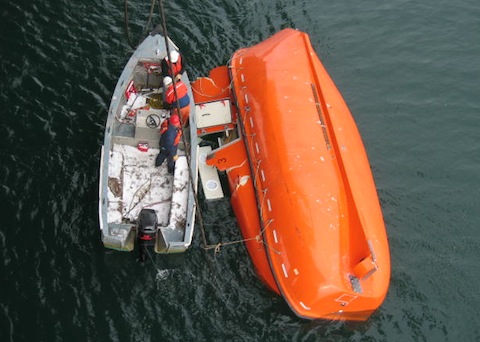 A treasured microblog correspondent alerted us to this heap of bad news from the maritime realm: cruise-ship crews will henceforth be receiving more lifeboat training than ever before. This decision by the Cruise Lines International Association was surely made with the best of intentions, as the organization doesn’t want a repeat of the chaos that marred the evacuation of the Costa Concordia last January. But as previously discussed on Microkhan, lifeboat drills are invariably far more lethal than the disasters they’re supposed to guard against. Let us quote once more from this damning report:
A treasured microblog correspondent alerted us to this heap of bad news from the maritime realm: cruise-ship crews will henceforth be receiving more lifeboat training than ever before. This decision by the Cruise Lines International Association was surely made with the best of intentions, as the organization doesn’t want a repeat of the chaos that marred the evacuation of the Costa Concordia last January. But as previously discussed on Microkhan, lifeboat drills are invariably far more lethal than the disasters they’re supposed to guard against. Let us quote once more from this damning report:
In 2001 the Marine Accident Investigation Branch (MAIB) studied the UK’s merchant fleet accident reports for ten years and it showed that alongside entering confined spaces and falling overboard, lifeboat practice was the most dangerous area of operation. Sixteen per cent of fatalities happen during lifeboat drill – one death in eight – a chilling statistic.
MAIB concluded that there were major three factors in lifeboat training accidents which in the studied decade killed 12 seafarers and injured a further 87. Ironically over the same period they did not record one single instance where someone was saved by a lifeboat.
The report emphasized deficiencies in lifeboat design, maintenance and training. Their findings were confined to UK waters and therefore only pointed towards the global problem, but they were backed up by the Norwegian and Australian authorities with their separate investigations coming to similar conclusions. The Norwegians estimate that globally there are about 214,000 drills a year causing 1,000 accidents and as many as half causing fatalities.
The fact that this data is so difficult for policy makers to process speaks volumes about the limits of human decision making.
(Image via Martin’s Marine Engineering Page)
Upside-Down World
January 29th, 2013
 There is a certain breed of non-fiction story that I call the bridge burner—a tale so damning that it ensures that the writer will never again enjoy access to a vast swath of trusted sources. A prime example would be Jon Lee Anderson’s recent “Slumlord,” in which he paints a vivid portrait of the chaos that Hugo Chavez has created in Venezuela. Although “chaos” is perhaps too mild a word to characterize the atmosphere that Anderson describes—the place he describes more closely resembles the dystopian prison in Escape from New York than a functioning nation.
There is a certain breed of non-fiction story that I call the bridge burner—a tale so damning that it ensures that the writer will never again enjoy access to a vast swath of trusted sources. A prime example would be Jon Lee Anderson’s recent “Slumlord,” in which he paints a vivid portrait of the chaos that Hugo Chavez has created in Venezuela. Although “chaos” is perhaps too mild a word to characterize the atmosphere that Anderson describes—the place he describes more closely resembles the dystopian prison in Escape from New York than a functioning nation.
There are many stellar set pieces in the story, including a lengthy exploration of life in the Torre de David, an unfinished skyscraper now inhabited by squatters and ruled by a quasi-religious gangster chieftain. But the anecdote that will always stick with me is this passage, in which Anderson visits one of the many prisons now entirely controlled by armed inmates:
A prison official drove me on a dirt road around the perimeter fence. We stopped, and I saw two tall cellblocks with scores of bullet holes in their facades; where te windows should have been there were jagged holes, and a large group of shirtless, rough-looking men looking down at us. A thick black line of human excrement ran down an exterior wall, and in the yard below was a sea of sludge and garbage several feet deep. “We can’t hang around here,” the official said. “If we stay too long, they might shoot at us.” As we drove off, he explained that there were only six guards at a time inside the prison. The inmates allowed one handpicked guard to retrieve dead bodies they left there.
I very much doubt that Anderson will get any sit-downs with Chavez’s successor. But he has placed himself in excellent position to report on the nascent opposition to the Chavista “dynasty,” which seems to be taking shape outside of Venezuela’s borders.
(Image via Caracas Chronicles)
→ 2 CommentsTags:dictatorship·Jon Lee Anderson·prisons·The New Yorker·Venezuela
Knife Tricks
January 25th, 2013
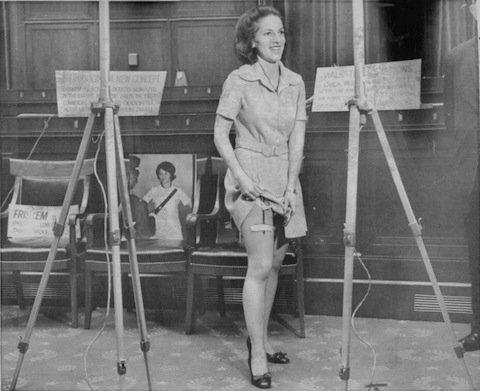 The effervescent young lady above worked for an early manufacturer of handheld metal detectors. Here she shows a Congressional panel how the skyjackers of the the late 1960s managed to sneak knives aboard planes, even when selected for manual frisking by airline employees.
The effervescent young lady above worked for an early manufacturer of handheld metal detectors. Here she shows a Congressional panel how the skyjackers of the the late 1960s managed to sneak knives aboard planes, even when selected for manual frisking by airline employees.
From my very nascent collection of skyjacking-related images, tied into the forthcoming release of that project y’all will be surely sick of hearing come June. Apologies—at least until there’s only a month to go before publication, I’ll try and limit these posts to one-per-week. Deal?
→ 2 CommentsTags:gadgets·skyjacking·technology·The Skies Belong to Us
The Unapologetic Cipher
January 24th, 2013
I’m midway through David Remnick’s biography of Muhammad Ali, which is pretty much as stellar as you would expect. Yet there are times when I wish the narrative would instead focus on the tragic figure of Sonny Liston—what can I say, I’m attracted to characters who will never be universally adored, and who perhaps take some modicum of pleasure in that fact. The snippets of Liston backstory that the book provides motivated me to delve more deeply into the man’s bittersweet arc. The most enjoyable contemporary story I’ve uncovered so far is this one, from a 1962 issue of Life. It’s hackneyed, for sure, especially in its structure; like every other account of Liston’s rise from convict to contender, it uses purplish prose to explore his moral fitness to wear the heavyweight crown. But the piece also contains plenty of gems based on interviews with the famously tight-lipped Liston; my favorite concerns the man’s pre-fight nutritional regimen:
When in hard training for a fight he eats only once a day. “When you get in the gym and start jumping the food hits the top of your stomach and sticks there,” he explains. His one meal never varies—steak eaten nearly raw. When he goes to camp he brings along 50 or 60 steaks packed in dry ice. “That’s why they have training camps,” he explains. “They take away women and feed you raw meat and this puts you in a fighting mood. It makes you angry and brings up the evil inside of you, so that when the man in your corner says, ‘Go in and kill ’em,’ you do.”
For some reason, the one Liston bio written during his heyday is out-of-print and ludicrously expensive. If anyone has a copy they can loan out, I’ll send you a signed copy of Now the Hell Will Start.
The Talented Mr. Quan
January 22nd, 2013
 The Phocea is one of the world’s largest superyachts, checking in at an impressive 75-meters in length. It has also proven to be a monkey’s paw of sorts, as great misfortune has befallen its ultra-successful owners:
The Phocea is one of the world’s largest superyachts, checking in at an impressive 75-meters in length. It has also proven to be a monkey’s paw of sorts, as great misfortune has befallen its ultra-successful owners:
The Phocea was built in Toulon in 1976 for yachtsman Alain Colas who called her Club Mediterranee. She competed in a Trans-Atlantic race for Colas, came second. Colas disappeared at sea the following year.
In 1982 French business man Bernard Tapie bought Phocea and had her converted to a private yacht at great expense. Tapie christened her Phocea, in honour of the Phoenicians who founded Marseilles where she was refitted.
Tapie later went to jail over corruption offences and in 1997 French Lebanese socialite Mouna Ayoub purchased the yacht – after she sold one of her diamonds, the largest yellow diamond in the world, and several other lesser jewels to pay for the US$17 million refit.
At some point after Ayoub’s sell-off of assets, the yacht fell into the hands of a man who goes by Pascal Anh Quan Saken. Quan claims to be the founder of the Billionaire Yacht Club, as well as the holder of an MBA from the “University of Minneapolis.” (Full curriculum vitae here.) But the PNG Post-Courier asserts that he is actually a trafficker of contraband who has no real ownership of the Phocea. In fact, Quan seems to have registered the ship in Malta by submitting forged documents; as a result, the Phocea was impounded by officials in Vanuatu, some of whom have been accused of illicit dealings with Quan. (Though he was apparently born in Vietnam, Quan appears to hold a diplomatic passport from Vanuatu.)
Quan is rumored to have flown to Papua New Guinea, to ask the government there to register the Phocea so it can be liberated from Vanuatu. I hope someone in Port Moresby asks him how, exactly, he got his hands on the yacht. My hunch tells me that it was exchanged for either arms or drugs, which is why there is no legit record of its sale. On a planet where large financial transactions are increasingly likely to come to the attention of the authorities, old-fashioned bartering may be the way of the future on the black market.
Check out a full list of stories on L’affaire Phocea here.
→ 1 CommentTags:crime·maritime·Papua New Guinea·Pascal Anh Quan Saken·Phocea·Vanuatu
Be Thankful for What You’ve Got
January 18th, 2013
 A bundle of statistics to chew over the next time you set foot in an automated elevator. Yes, the steel boxes of today lack a certain charm compared to the ornate, manually-controlled brass contraptions of yore. But at least they’re not death traps. (Current accident statistics here.) Humans are great at many things, but reliable elevator operation is not one of them.
A bundle of statistics to chew over the next time you set foot in an automated elevator. Yes, the steel boxes of today lack a certain charm compared to the ornate, manually-controlled brass contraptions of yore. But at least they’re not death traps. (Current accident statistics here.) Humans are great at many things, but reliable elevator operation is not one of them.
Comments Off on Be Thankful for What You’ve GotTags:elevators·public safety·technology·transportation
A Serious Approach
January 17th, 2013
 If you pay the slightest bit of attention to high-profile criminal cases, you have doubtless encountered the sketches of Harvey Pratt. The Oklahoma-based forensic artist is one of the masters of his craft, and thus a frequent attendee at trials where cameras are verboten. He is also a pioneer of post-mortem reconstruction techniques, which allow police to envision what severely traumatized homicide victims looked like prior to meeting their unfortunate ends.
If you pay the slightest bit of attention to high-profile criminal cases, you have doubtless encountered the sketches of Harvey Pratt. The Oklahoma-based forensic artist is one of the masters of his craft, and thus a frequent attendee at trials where cameras are verboten. He is also a pioneer of post-mortem reconstruction techniques, which allow police to envision what severely traumatized homicide victims looked like prior to meeting their unfortunate ends.
Pratt’s curiosity is not confined to the grisly, however: He is also the most serious-minded Bigfoot artist you’ll ever encounter. In attempting to shed light on the mythical creatures that allegedly stalk North America’s forest, Pratt deals with primary sources no differently than he would for his day job:
The North America Bigfoot Search has brought together years of law enforcement investigative experience and forensic artistry to the field of Bigfoot studies with it’s new book The Hoopa Project: Bigfoot Encounters in California. The Executive Director of North America Bigfoot Search, Dave Paulides has spent the last three years researching and working in the far northern portion of California’s Humboldt County, concentrating in the area of the Hoopa Valley Indian Tribe jurisdiction.
For this project, Harvey Pratt was commissioned to meet with witnesses who saw a Sasquatch and complete forensic sketches based on his interview with them. He met with 13 witnesses and completed 16 forensic sketches that are featured in The Hoopa Project. The drawings bring forth the surprising conclusion that Bigfoot’s facial features appear to be more human than originally thought.
A full gallery of Pratt’s Bigfoot-related work here. I am particularly fond of the perspective on “Researcher’s Last View,” as well as the sheer excess of “My Dark Passenger.”
Comments Off on A Serious ApproachTags:art·Bigfoot·crime·cryptozoology·forensic art·mythology
Someone Take Him Up on This
January 15th, 2013
 Belarusian dictator Alexander Lukashenko, who we prefer to think of as The Armed Clown, has a famously high opinion of his own athletic prowess. Today that hubris led him to make a proposition that I hope he will live to regret, as he wrote a check with his mouth that his body surely cannot cash. In the midst of a press conference at which he addressed Hugo Chavez’s ailing health, Lukashenko felt the need to emphasize that he is in no danger of relinquishing his “throne.” And as is his wont, he stressed this fact in the most brazen way possible to journalist in attendance:
Belarusian dictator Alexander Lukashenko, who we prefer to think of as The Armed Clown, has a famously high opinion of his own athletic prowess. Today that hubris led him to make a proposition that I hope he will live to regret, as he wrote a check with his mouth that his body surely cannot cash. In the midst of a press conference at which he addressed Hugo Chavez’s ailing health, Lukashenko felt the need to emphasize that he is in no danger of relinquishing his “throne.” And as is his wont, he stressed this fact in the most brazen way possible to journalist in attendance:
If you question my health, please, put on skates, bring a hockey stick or skis and we will try it with you. You are younger than me. If you want, we can do it in front of everyone. 10km race. If you finish first, you will become president by right of health tomorrow.
You have no idea how fondly we wish for this contest to happen. Because at this point, it looks like old-school trial-by-combat is the only way the Belarusian people will get the change in government they so desperately need.
→ 1 CommentTags:Alexander Lukashenko·Belarus·dictatorship·hockey·sports
The Mouths of Babes
January 11th, 2013
 Given its obviously confrontational nature, it’s a wonder that Shurooq Amin’s series of paintings entitled “It’s a Man’s World” were shown in Kuwait City at all. The exhibition lasted all of three hours before the secret police shut it down, citing complaints that the art was both “anti-Islamic” and “pornographic.” To her great credit, Amin viewed the closure not as a setback, but as inspiration for her next project. She was aided in that process by her young daughter, whose malapropism led to a eureka moment:
Given its obviously confrontational nature, it’s a wonder that Shurooq Amin’s series of paintings entitled “It’s a Man’s World” were shown in Kuwait City at all. The exhibition lasted all of three hours before the secret police shut it down, citing complaints that the art was both “anti-Islamic” and “pornographic.” To her great credit, Amin viewed the closure not as a setback, but as inspiration for her next project. She was aided in that process by her young daughter, whose malapropism led to a eureka moment:
As soon as I recovered from the shutdown of my show, the pain of that, I immediately started working on the next series. It started with the title. My 12 year old daughter heard people talking about my show, so she came up to me and asked: “Mama, what does popcornographic mean?” I asked her why, and she said she heard people say my show was shut down because it was “popcornographic.” Of course I immediately knew what she meant. So it stuck. I thought: “This is perfect!” I decided to use the term against them by using the version my daughter used. This way nobody can censor it. And the series will explore the actual impact of censorship, lack of freedom of expression and all things taboo.
Check out several more paintings from the “It’s a Man’s World” series here.
Comments Off on The Mouths of BabesTags:art·censorship·Kuwait·Shurooq Amin
Espionage Made Easy
January 9th, 2013
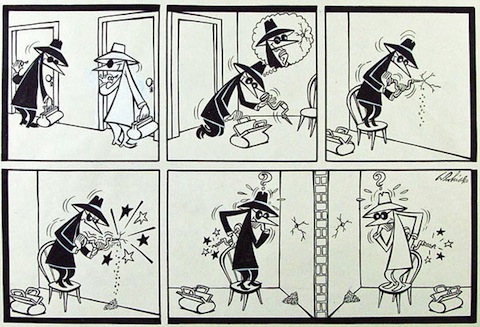
The Department of Justice rarely indicts people it has no genuine hope of prosecuting, but an exception was recently made in the case of two Chinese nationals, Wan Li Yuan and “Jason Jiang” (true name unknown). The men, who will surely not be foolish enough to travel to these shores again, are alleged to have gotten their hands on some devices manufactured by Lattice Semiconductor—devices that, because they have obvious military applications, are not supposed to be exported without government clearance. What is astounding about the case is the elegance of the subterfuge employed by Yuan and “Jiang,” who took a page out of the con-man playbook by taking advantage of an unsuspecting intermediary. The whole devious plot is outlined in the richly detailed indictment (PDF):
Defendant Wan Li Yuan falsely claimed to be a person named Nicholas Bush, and falsely claimed to be an employee of Company A, a company located in New York. Defendant also falsely claimed that Company A had a website. In reality, defendant was associated with a China-based company called China Wingwish Group Co., Ltd., which was involved in the procurement of dual-use electronic goods…
On or about April 6, 2010, defendant Wan Li Yuan, aka Wanli Yuan, aka Nicholas Bush, aka Nick Bush, aka Tony Yuan, caused a website to be created which falsely indicated that the website belonged to Company A of New York. Much of the design and wording on this fictitious website was copied from the website of a legitimate Canadian company with no connection to or association with defendant or his business or the business of Company A of New York.
Granted, Yuan seemed to build a fake site somewhat more sophisticated than, say the one for Jukt Micronics. But you have to think a simple Google search could have spared everyone a lot of heartache and loss. Simple frauds can be undone by simple measures.
Comments Off on Espionage Made EasyTags:business·China·crime·espionage·fraud·technology·Wan Li Yuan
The Not-So-Delicate Dance
January 8th, 2013
Scrambling like mad to deal with Wired and book-related duties as the week bleeds toward Humpday. Back tomorrow with something halfway spectacular about Chinese industrial espionage.
Comments Off on The Not-So-Delicate DanceTags:India·kabaddi·sports
The Pangolin’s Curse
January 4th, 2013
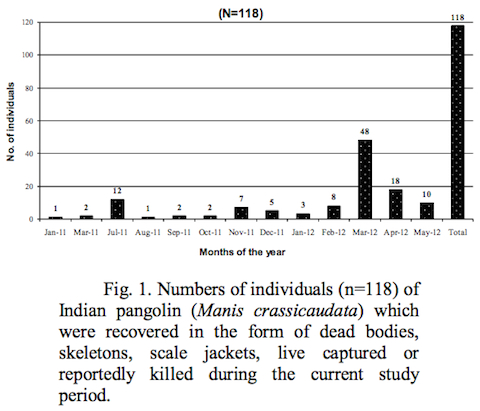
There are few environmental tragedies I find more puzzling than the decimation of the pangolin, a phenomenon recently covered by notable Microkhan ally Dan Morrison. Like rhino horns, pangolin scales are in high demand in Asian markets, primarily for medicinal and epicurean purposes. Yet there is little evidence that the scales work better than placebos, something that consumers with the means to pay for the commodity should presumably realize. The persistence of these kinds of myths is one of the real head-scratchers of modern human behavior.
Yet even if the masses suddenly came around to the idea that pangolin scales were actually less effective than, say, a couple of aspirin, the animal might not survive for the long-term. That’s beacause, according to this recent study (PDF) from Pakistan, there may be a large secondary market for the scales:
It has also been revealed from local reliable sources that scales of Indian pangolin are transported to two main cities in the country viz., Islamabad and Lahore and it is suspected that these are being used in manufacturing bullet-proof jackets. This seems probable in the scenario of terrorism in the country for the past 10 years where the demand of such jackets must have increased many folds.
I can find absolutely no studies comparing the blast-absorption properties of pangolin armor with those of Kevlar. But I find it incredibly difficult to believe that the natural option would win the day in that match-up.
→ 4 CommentsTags:animals·environment·Pakistan·pangolins·smuggling
Another 365
December 31st, 2012
I usually spend the day before New Year’s reflecting on the various triumphs and numerous failures of the preceding twelve months. To my chagrin, however, that just isn’t possible this year—the pace of dealing with two kids is more relentless than I had dared imagine prior to the Grand Emprette’s birth. I’ll have to settle for cleaning my desk, paying off some lingering bills, and (if I’m lucky) making a beer run in preparation for that brief, peaceful interlude between Microkhan Jr.’s bedtime and midnight. Hope you have something far more raucous planned to mark the beginning of our next revolution around the Sun. See you back here at midweek.
Comments Off on Another 365Tags:Ashe Bhosle·Bollywood·music
“An Innocent Third Party”
December 28th, 2012
 When we hear about the ill-advised nature of high-speed police pursuits, it’s usually in relation to injuries suffered by pedestrians or occupants of uninvolved vehicles. But Brian Werner, a Nebraska man who was paralyzed in such a chase, was actually a passenger in a car being pursued. He sued the state for damages and was recently awarded $1 million—the maximum allowable under Nebraska law. As the appellate court’s decision makes clear, the case boiled down to whether Werner—who was in possession of methamphetamine at the time—had any culpability at all for the driver’s rash decision to try and evade arrest:
When we hear about the ill-advised nature of high-speed police pursuits, it’s usually in relation to injuries suffered by pedestrians or occupants of uninvolved vehicles. But Brian Werner, a Nebraska man who was paralyzed in such a chase, was actually a passenger in a car being pursued. He sued the state for damages and was recently awarded $1 million—the maximum allowable under Nebraska law. As the appellate court’s decision makes clear, the case boiled down to whether Werner—who was in possession of methamphetamine at the time—had any culpability at all for the driver’s rash decision to try and evade arrest:
Werner testified that he did not encourage Korth to flee from law enforcement and that he had asked Korth to let him out of the car. Werner explained that he had “heard” that Korth had previously fled from law enforcement, that “nothing good was going to come” from being in the car, and that “it just was not going to end good.” The County objected on hearsay grounds to Werner’s testimony about having “heard” of Korth’s prior history of fleeing from law enforcement. The court overruled the objection and admitted Werner’s testimony.
The court found for Werner. It found that law enforcement had engaged in a “vehicular pursuit” of Korth’s car and that the pursuit was a proximate cause of Werner’s injuries. The court also found that under § 13-911, Werner was an “innocent third party.” We have defined an “innocent third party” as “one who has not promoted, provoked, or persuaded the driver to engage in flight from law enforcement personnel and one who is not sought to be apprehended in the fleeing vehicle.” The court found that [Officer] Wemhoff sought to apprehend the driver for suspected driving under the influence and speeding. Because the court determined that Werner was the passenger in the fleeing car—rather than the driver—the court concluded that Wemhoff had not sought to apprehend Werner. And the court determined that Werner had not “promoted, provoked or persuaded” Korth to flee. The court found that Werner was an “innocent third party.”
What I find most striking about this decision is that it seems to run counter to the way that the law determines who qualifies as an accomplice in criminal matters. So many times, unsuspecting people who have driven acquaintances to and from crime scenes have ended up at the defendant’s table—particularly in cases involving drugs. But in this civil matter, the court was clearly more forgiving of Werner’s character flaws.
At least one justice had reservations about this decision, however: In a concurring opinion, he asked the Nebraska legislature to alter its definition of “an innocent third party,” so that men like Werner would no longer be eligible for damages. Ending counterproductive police pursuits would seem like a wiser course of action, though.
The Simple Can Be So Difficult
December 27th, 2012

A few days before Christmas, a milestone of sorts was reached at the Bangladesh University of Engineering and Technology: for the first time ever, a few eggs were cooked on a kerosene stove. This was significant not because of the quality of the meal produced, but rather because the stove generated eight watts of electricity while operating—enough to light up a pair of LED lamps. This feat has been a longtime goal of the Score-Stove Project, which aims to create the hardware necessary to convert the excess energy of cooking into usable electricity. Sounds easy enough, but it has proven quite tough to do in a cost-effective manner—the project has a targeted price-point of around $35 per stove (PDF).
The Bangladeshi prototype appears fairly cumbersome at this point, but perhaps a mass-market version is no longer a total pipe dream. That progress is a testament to the dedication of geeks who labor in anonymity, yet are tackling challenges much more difficult than those faced by builders of apps and designers of tablets. Their stories deserve a much wider audience, to remind us that fantastic technological innovation isn’t a phenomenon confined to predictable precincts.
Comments Off on The Simple Can Be So DifficultTags:Bangladesh·food·gadgets·Score-Stove·technology
The Power Down
December 21st, 2012
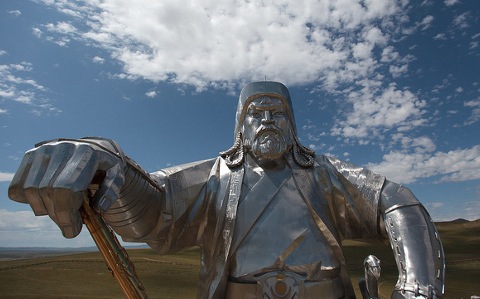
All that stands between me and a five-day vacation is a pair of 300-word Wired pieces. Let me get to that so I get to teaching Microkhan Jr. the finer points of falconry. Back here after the Christmas lull.
Born to Greatness
December 19th, 2012
Alice Strick, the current world record holder in the Canadian-style one-foot high kick, is part of an athletic dynasty: her mother and cousin were also champions at the World Eskimo-Indian Olympics. While Strick’s feat in the clip above may seem effortless, I can assure you that it required near-superhuman athleticism. I know this because I just tried it here at Microkhan world headquarters; suffice to say that the years have not been kind to whatever hops I once had. Perhaps the four-man carry is more my speed these days.
→ 6 CommentsTags:Alaska·Alice Strick·sports·World Eskimo-Indian Olympics
Beyond Red/Blue
December 18th, 2012

As the map above shows, our nation’s pattern of monkey-ownership laws is not easy to predict based on geography alone. Reliably blue states such as Washington and Illinois have no problem with personal primates, while conservative bastions such as Louisiana and Georgia have enacted blanket bans. I can only guess that legislators react to specific incidents, which open their eyes to the utter folly of adhering to strictly ideological positions.
→ 1 CommentTags:law·pets·primates
Parallel Lives
December 14th, 2012

Ireland’s Travellers invite a fair amount of voyeurism on account of their reputation for physical toughness and petty crime. The conventional wisdom is that this social group has decided to remain distinct from mainstream Irish society, in order to preserve their unique cultural traditions. But German photographer Birte Kaufman, who has documented life in a Traveller caravan in a surprisingly intimate way, contends that these outsiders didn’t necessarily elect to exist on the margins. Rather, they drifted away once the skills for which they were known—specifically fixing mechanical gadgets—became largely irrelevant to the modern economy:
In earlier times, when they were migrant workers or tinkers, everybody needed them; they were accepted. And then they lost their function in society, and they had to find other ways of doing business. I don’t know what has lead to the breakdown, but it is to do with the fact that a lot of them lost their function in mainstream society. Something has happened. I would say it is deep inside, you don’t see it completely; it is not obvious, but you see it in the way that some of the people look at them. They are so completely different in some ways from the main settled Irish community.
The whole project is well worth your time, as Kaufman took an immersive approach and actually joined her camper to a Traveller caravan. She gets major points for commitment to the endeavor.
Comments Off on Parallel LivesTags:economics·Ireland·Travellers
Unequal Trade
December 12th, 2012

If you have even a passing interest in colonialist cunning, you owe it to yourself to check out the National Museum of Australia’s dynamite exhibit on Aboriginal breastplates. These were baubles that the European arrivals provided to Down Under’s native inhabitants, ostensibly to honor certain individuals for being community leaders. But the givers desired something in return that was, of course, much more valuable than the metal that went into the trinkets:
By the 1830s it was common practice among pastoralists to present the Aboriginal man perceived to be the local leader with a gorget stating his position of authority in the vicinity of the settler’s new property. In return, the Aboriginal leader was expected to prevent his people from interrupting the settler’s pastoral endeavours and where possible to supply labour or information about the land.
This tactic reminds me so much of the genius maneuvering of King Louis XIV of France, who kept the aristocrats in line by having them scramble after petty jobs at Versailles. The powerful get that way by convincing their rivals to settle for things that only have the illusion of value.
That said, the Aboriginal breastplates are gorgeous works of art. Check out the whole gallery here, and read about the significance of all the kangaroo and emu motifs here.
→ 1 CommentTags:Aboriginal breastplates·art·Australia·colonialism·politics
Accept Your Fake
December 10th, 2012

One of the issues I’m grappling with on my in-development Wired story is how we’ll need to redefine the notion of authenticity in the era of ubiquitous 3D printing. If I can make a perfect copy of any object without leaving the comfort of my home, does the original lose its aura of value?
That’s a question that folks in New Ireland are now confronting, as they ponder whether to accept 3D copies of ceremonial masks that German colonialists swiped in the 19th century. Before I read the piece, I could only consider the German offer a slap in the face—why shouldn’t they be the ones left with the copies, since they only obtained the originals through theft? But two current New Ireland residents do excellent jobs of playing the devil’s advocates in the piece:
“I realise that these artefacts are stored in special places and special care,” says Adam Kaminiel, a modern Nalik carver. “I don’t think we have that special place and special care at the moment.”
Chief of the New Ireland clan, Martin Kombeng adds that matters could get complicated if the masks were repatriated.
“Maybe I think differently, but I prefer to leave the masks as they are because once they are back, many people will try to claim them.”
It is Kaminiel’s argument that I find most interesting, because he is essentially saying that he would prefer that the originals be preserved for the long-run rather than have them return and deteriorate. Even if the copy and the original are indistinguishable from one another, he feels that the mask created by his ancestors has intrinsic value separate from its appearance. I have to wonder if this is a viewpoint that will vanish over the next few generations, as 3D printing entirely blurs the line between fake and real. The psychological heft of objects may no longer be in who created them, but in purely in how they are used.
→ 3 CommentsTags:3D printing·archeology·masks·New Ireland·Papua New Guinea
UNIVAC Could Have Saved Us
December 7th, 2012
Desperately wanted to do a West Papua post this morning, but a critical Wired deadline beckons. In my absence, please marvel at the UNIVAC promotional film above, in which the early computer is touted as the instrument capable of liberating our species from meteorological uncertainty. Ah, to think there was a time when the phrase “two thousand calculations per second” blew minds.
Comments Off on UNIVAC Could Have Saved UsTags:computers·meteorology·UNIVAC
Too Fat for the Fuzz, Cont’d
December 5th, 2012
After I microblogged this morning about overweight Indonesian cops, a treasured reader reminded me that Microkhan had covered this territory before. In July 2009, I wrote about the case of Chris Parent, a police officer in Bellevue, Nebraska, who was fired for being too large to perform his job properly. (See video above, which was Exhibit A in his department’s decision.) Parent contested his termination, however, and apparently was vindicated, as this story about the retirement of Bellevue’s embattled police chief makes clear:
Stacey, who has worked for Bellevue since 1978, has been involved in several controversies in Bellevue in recent years. He fired Police Officer Christopher Parent for being overweight, saying it violated a department policy requiring officers to maintain a high level of physical conditioning. Parent’s termination was overturned by the courts.
After the city paid Parent more than $103,000 in back pay, Stacey placed him on indefinite paid administrative leave. As a result, the city paid Parent about $170,000 in salary and benefits without his working a single day.
The whole story is worth a read, if only to marvel at the intrigue in Bellevue’s police department. It’s like a miniature version of The Wire over there in eastern Nebraska.
→ 1 CommentTags:law·Nebraska·police


